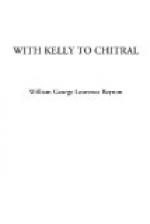Off we started, the Punyal Levies working down the right bank, the Hunzas on the left, the main column following the left bank of the stream. By 4 P.M. we reached the ford and crossed to the right bank, the water not being much above our knees. And almost immediately after, we saw some men drawn up on the spur we were approaching; they turned out to be the Mastuj garrison, who, on finding the besieging force halting, had come out to find out the reason. If they had only heard our guns and turned out at once, they would have cut the line of retreat of our opponents, and the whole crew must have been wiped out. Unfortunately the fort of Mastuj is built far down the reverse slope of a fan, and although some of the sentries reported they heard firing, it was thought they must be mistaken.
By 5 P.M. we had got on to the spur, and found Moberly, with part of the garrison, all looking very fat and fit; evidently the siege had not worried them much so far. A detachment of the 14th Sikhs (the remains of Ross’s company) were left on the spur to cover the baggage coming in, while our column trotted down to the fort, getting there by 5.30 P.M. Here we found Jones with his arm in a sling. Our force bivouacked in a garden attached to the fort, the trees of which had been lopped to deprive the enemy of shelter, and the farther wall destroyed. This we precious soon built up again, and within an hour our force was comfortably entrenched and cooking its dinner.
What a blessing it was to be down again in a decent climate! Fires were still pleasant at night, but in the daytime the bright, cool weather was splendid.
Moberly’s servant soon had some tea and chupatties ready, and while we were eating them, Bretherton, who had been out clearing some village on the other side of the fort, came in.
There was lots of news, both to hear and relate, and we were hard at it when there came the sound of a volley from the direction in which we were expecting the baggage.
Somebody said, “Cuss those niggers! why can’t they let us have our tea in peace?”—it wasn’t Stewart,—and there was a general scramble for swords and belts. A company of the Pioneers was soon doubling off, while the rest of us strolled up the road to see what the row was. We met the baggage coming in, and heard that the 14th Sikh picket had heard some people moving in the river bed, and had let drive a volley at them—result unknown. As soon as the last of the baggage had passed, we followed it, and the picket was withdrawn. Later that night we sent back a messenger with an account of the day’s fighting and the relief of Mastuj to Gilgit, but the messenger—a levy—shortly returned, having been fired on, and returned the fire, so it was evident that a good many of the enemy were still sneaking about.




